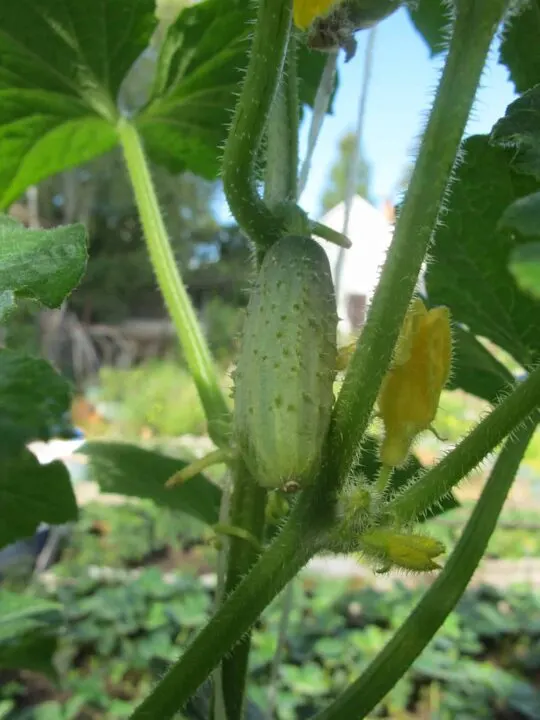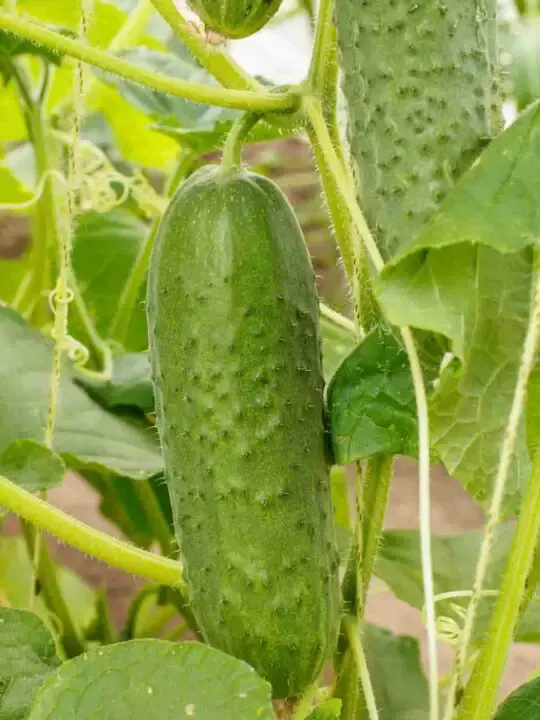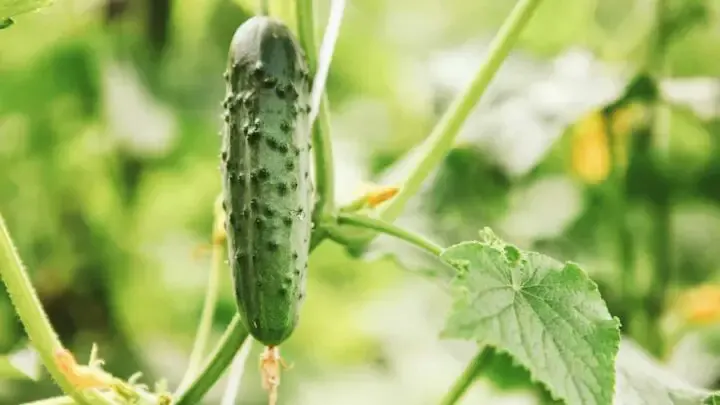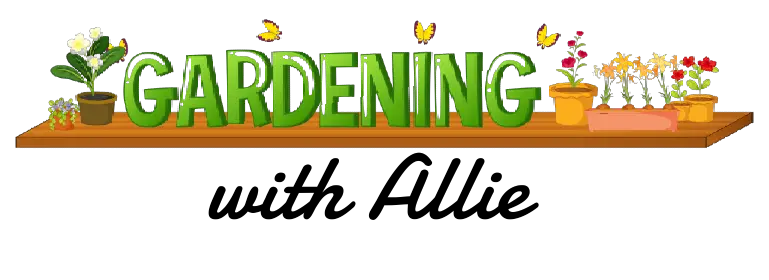If you are new to cucumber growing, you’ve likely noticed that your cucumbers have developed a strange feature. You may be wondering, why are my cucumbers prickly?
Like many species of animals and plants, cucumbers produce prickly textured skin to protect themselves from predators and simply because prickles are an inherited trait. Pickling cucumbers typically have sharper spines, while slicing cucumbers may have gentle hair-like spines.
Continue reading to learn more about cucumbers and the prickly texture that they commonly manifest.

Is It Normal For Cucumbers To Be Prickly?
Yes, it is normal for cucumbers to be prickly. In fact, most smooth cucumbers have already had their prickles removed. There are two main types of cucumbers; pickling and slicing. Pickling cucumbers are typically smaller and will have tougher and stronger spines.
Slicing cucumbers, on the other hand, tend to be much bigger. Instead of sharp spines, they will usually grow thin hairs that aren’t as sharp to the touch. Not all cucumbers grow with prickles or spines, but it’s more common than not for them to have a rougher texture that can be sharp to the touch.
3 Causes Of Prickly Cucumbers
- Cucumbers develop a prickly texture to deter animals from trying to consume them. If an animal eats a prickly cucumber, it will most likely poke them and feel unpleasant. That animal will eventually learn not to touch the cucumbers.
- Cucumbers also develop prickles to keep bugs and pests off of them. Bugs can carry diseases that will infect a cucumber and sometimes the whole plant. A bug won’t be able to walk on the spines of a cucumber. The spines can puncture them and kill them. Cucumbers develop prickles to protect themselves.
- Cucumbers are genetically wired to grow with spines. They receive their color, size, and shape from the same genetics. Every fruit and vegetable has unique traits, and being prickly is a common cucumber trait.

Should Cucumbers Be Prickly When Picked?
Yes, they definitely should. The spines do not fall off of cucumbers in the growing process. They will still be attached to your cucumbers at the time of harvest.
Removing the prickles from your cucumbers before they are picked could damage them and cause them to halt growth or affect their overall health. Wait until after you pick your cucumbers to remove the prickles. If you struggle to pick them with the spines still attached, wear a pair of sturdy gloves to protect yourself from getting poked.

Can Prickly Cucumbers Be An Inherited Trait?
Prickles on cucumbers are always an inherited trait. Think of a porcupine, for example. They develop quills to protect themselves from predators in the wild.
Other animals grow horns also to be used for self-defense against enemies. Those animals all inherit their unique traits from their ancestors. The trait is passed down through DNA. That is also the case with cucumbers. They inherit prickles to protect themselves.
What Kind Of Cucumbers Are Prickly?
It is common for pickling cucumbers to have the most prominent prickles. Larger, slicing cucumbers will usually have thinner, hair-like prickles that aren’t very sharp to the touch. Below is a list and description of 6 types of cucumbers with prickles.
| Kirby CucumbersThese are a small variety of cucumbers that are typically used for pickling. They are sometimes as light as yellow and can also be dark green in color. They always grow with prickles on them. | |
| Dasher ll | This variety grows with white-colored spines attached to dark green skin. They grow to about 8 inches in length and remain very slender. |
| Salad Bush | These cucumbers are a more compact variety which makes them favorable for container growing. They are dark green with a rough prickly texture to them. They usually grow to 8 inches long. |
| Burpee Pickler | Growing at around 3-5 inches long, these unique pickling cucumbers actually develop black-colored spines. You can expect large harvests from this specific variety of cucumbers. |
| Parisian | Parisian cucumbers have a large number of prickles compared to other varieties. They grow the best in container gardens or raised beds. Interestingly enough, they are resistant to many diseases. |
| Homemade Pickles | These are commonly used for slicing and also pickling. They are a popular cucumber that has tiny sharp prickles all over them. They are unique in that you can pick them when they are young so they are small enough to pickle. They become slicing cucumbers as they grow older and bigger. |

How Do You Get Rid Of Cucumber Spikes
- If your cucumber spines are fairly thin and small, removing them won’t take much. You can simply scrape them off with your fingernail. If the spines are hair-like, then you won’t need to protect yourself with gloves during the removal process. It might even be easier to rub the spines off gently with your finger under running water.
- If your cucumber spines are sharp or on the thick side, wear gloves to protect your hands while you are removing the spines. Simply run them under water, and scrub them with a sturdy brush to gently make them smooth. With a thick towel, you can remove some tougher but more manageable spines on cucumbers. Wrap your towel around the entire cucumber and use it to rub the spines off. This may be a gentler process that will limit possible damage to your cucumbers.
Final Thoughts
If you haven’t grown your own cucumbers before, you probably thought they were always smooth. The truth is, the cucumbers you see in grocery stores had their prickles removed before they were sold. Consuming the prickles on cucumbers is very unpleasant and can also be unsafe. Although it may be frustrating that your cucumbers are prickly and sometimes are to handle, be thankful that your cucumbers are healthy and tasty. They could grow efficiently and successfully because they had prickles to fight off pests that could damage them. Removing the prickles of cucumbers is very simple and worth it in the end.

Hi there, my name is Allie and welcome to my blog; GareningWithAllie!
Much of what you see written here is just our personal experiences with gardening. Along with the content I write here, there is also a unique collection of gardening topics covered by some of our close friends. I hope you find everything you read here to be helpful, informative, and something that can make your gardening journey the most lovely experience ever! With that said, Happy Gardening!
